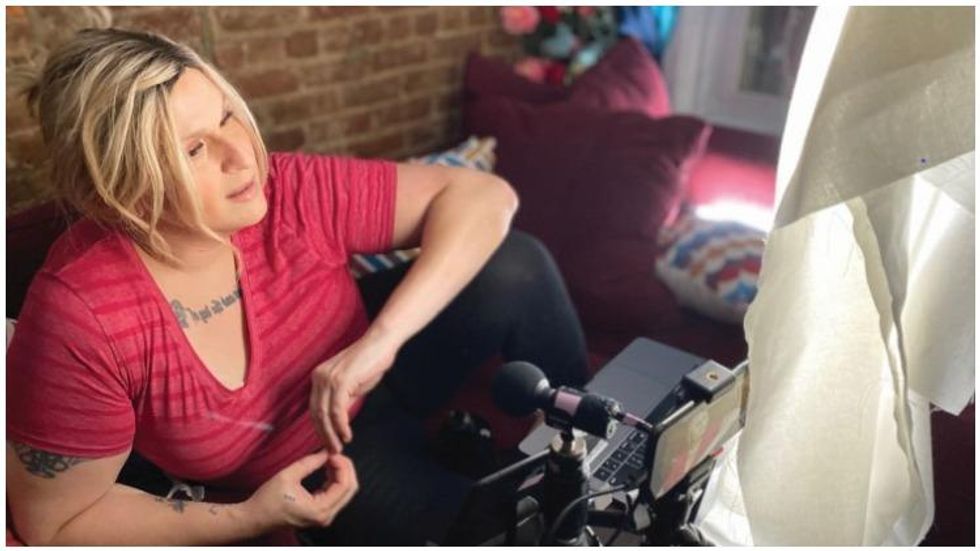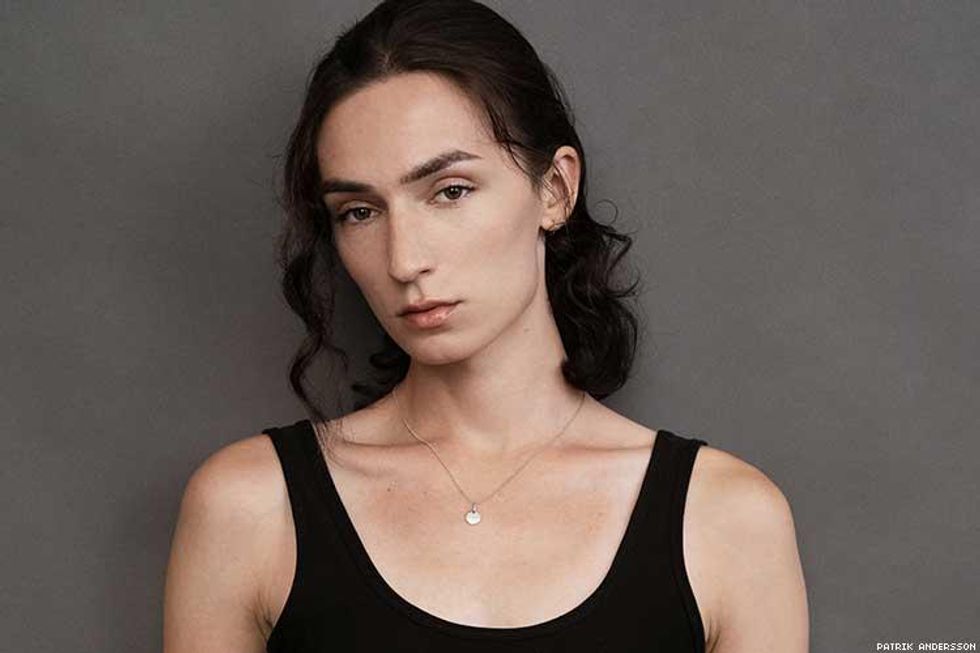In Noah's Arc: The Rona Chronicles, Noah (Darryl Stephens) and Wade (Jensen Atwood) share a romantic slow dance...with masks on.
Welcome to making TV during a pandemic. In normal times, show reunions can be tricky. However, a pandemic makes a physical regathering almost impossible without health risks.
Patrik-Ian Polk, the creator of the groundbreaking Black LGBTQ+ series, got creative. He brought his 15th-anniversary reunion into the world of the pandemic, allowing cast members to Zoom into their storylines. The couple's scenes were shot by a "scant" crew observing pandemic guidelines.
Challenges arose. Stephens expressed anxiety about being maskless around his scene partner. So Polk "tried to make masks a part of the aesthetic, but it still felt odd to me." At one point, Wade, awaiting results of a COVID-19 test, wears full personal protective equipment as a visual satire of the situation.
"Thankfully, no one turned up sick," says Polk, who was pleased with the 500,000+ audience. "The lesson here is -- as always -- the story is what matters most. If you tell a good story, the setting and locations don't matter so much."
Hollywood paused most of its productions in March due to the pandemic. But Polk was among the LGBTQ + pioneers showing Tinseltown a way forward. The remote-technologies format of Noah's Arc will be mirrored in several fall shows, including Netflix's Social Distance, Freeform's Love in the Time of Corona, and NBC's Connecting, a comedy about friends staying close through video chats.
This format has been an adjustment for LGBTQ+ talent. Connecting star Shakina Nayfack (Difficult People) can now add set design to her resume. "It's a lot of setup," Nayfack reveals.
Before filming through a laptop station, Nayfack covers the windows of her New York City apartment, fluffs pillows sent by NBC, adjusts lights, applies makeup, and styles a wig. Then, she joins a Zoom room with other actors who have gone through the same routine. "We are a part of every piece of the process," she says.

Technical difficulties are not uncommon. A 5:30 a.m. blackout occurred in NYC just as the day's final scene was filming. "I ruined it for everybody!" Nayfack exclaims. Most of the cast is connecting from Los Angeles, which presents its own odd work hours for Nayfack; one nighttime shoot lasted from 11:30 p.m. to 7:30 a.m.
Nayfack acknowledges that Connecting was "a huge experiment." But as a rare transgender series regular on a network TV show, she recognizes the importance of continuing to air LGBTQ+-inclusive entertainment in an election year. "There is a real sense of responsibility that I think all the people working on this show feel," Nayfack says. "We're making something for the moment when not a lot of things are getting made. And we want to speak to the moment in a way that provides comedic relief and also opportunity for a much-needed empathy."
This sense of responsibility is shared by Jesse James Keitel, a nonbinary transfeminine actor who plays a character with the same identity on Big Sky, a new ABC drama from David E. Kelley. Television is "the most powerful medium we have right now," Keitel says. "It's accessible to so many people, people who normally wouldn't get to experience a person like this." This belief gives Keitel purpose as they take the risks necessary to make TV in 2020.

Unlike Connecting, Big Sky, a drama about the hunt for a Montana serial killer, is filming in the real world. For the few productions attempting this, COVID testing is the new normal. Keitel was tested in New York prior to flying to Los Angeles for a promotional shoot. They tested twice more before departing to Vancouver, where Big Sky is being filmed; the high U.S. rates make production more hazardous.
However, Canada has strict rules for travelers. Visitors must isolate for 14 days, and quarantine violation is punishable with a fine and jail time. "I can't walk in the hallway to throw out my garbage," Keitel says via phone in August from a 450-square-foot apartment. The experience sparked strange dreams fueled by screams from a man across the street threatening to jump from his window. A phrase he uttered, "If I fall, I didn't jump, I was murdered," resonated with Keitel.
"Society wants [LGBTQ+ people] to jump off the ledge," Keitel says. "Society has put us on the ledge. So, sitting in quarantine, with only a couple days left, I'm excited to go for a fucking walk," Keitel adds. "Because all I think about is people like my character being on the ledge."
Even with so many LGBTQ+ people yearning to see themselves reflected during a terrifying time, not every production is ready to resume. Marja-Lewis Ryan, the showrunner of The L Word: Generation Q, recognizes that jobs are at stake but so are lives, particularly since the Showtime series is filmed in Los Angeles, a hot spot.
"I know there's other shows that are gearing to go back. I am happy to not be the first. We want to be ready for when that feels safe for us," says Ryan, who has devoted these past few months to the "luxury" of writing remotely with her team. "I know it's painful right now, but it would be a shit-ton more painful if someone wasn't here next year."
The L Word features a lot of sex. Logistically, Ryan is uncertain how filming that would work in the COVID era. Although filming with PPE might be an option, Ryan is hesitant to introduce the virus into The L Word since it has always been about "wish fulfillment."
"I don't really want to see Bette Porter wearing a mask," says Ryan. "I want to turn on the TV and I want to see them be...in a crowded bar. That's the dream right now."






































































Charlie Kirk DID say stoning gay people was the 'perfect law' — and these other heinous quotes